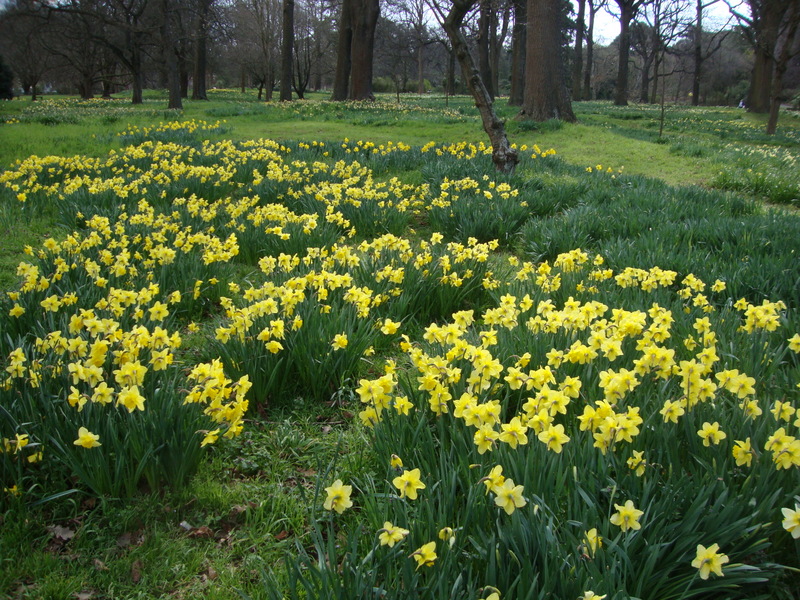- Details
- Written by: Kamran Mofid
- Hits: 5539

Photo:bing.com
Flowers are blooming, birds are singing, the days are getting brighter. What better way to sing the praises of Spring’s arrival than to read beautiful poetry.
Here are two poems I would like to share with you: One from Hopkins and the other from Wordsworth.
Gerard Manley Hopkins : The Poetry Foundation is one of the three or four greatest poets of the Victorian era. He is regarded by different readers as the greatest Victorian poet of religion, of nature, or of melancholy. However, because his style was so radically different from that of his contemporaries, his best poems were not accepted for publication during his lifetime, and his achievement was not fully recognized until after World War I.

Photo: poetryfoundation.org
‘Hopkins begins, “Nothing is so beautiful as spring.” If there is anything more beautiful, it is this poem. It has a heightened, rapturous and intoxicated quality: “The glassy pear tree leaves and blooms, they brush / the descending blue; that blue is all in a rush / with richness; the racing lambs too have fair their fling.” On a spring morning it is a poem one can recite that makes spring seem more intensely itself: even the lambs have been partying, and how that hallucinogenic “glassy” carries the line forward, unexpectedly filling it with light.’
Nothing is so beautiful as Spring –
When weeds, in wheels, shoot long and lovely and lush;
Thrush’s eggs look little low heavens, and thrush
Through the echoing timber does so rinse and wring
The ear, it strikes like lightnings to hear him sing;
The glassy peartree leaves and blooms, they brush
The descending blue; that blue is all in a rush
With richness; the racing lambs too have fair their fling.
What is all this juice and all this joy?
A strain of the earth’s sweet being in the beginning
In Eden garden. – Have, get, before it cloy,
Before it cloud, Christ, lord, and sour with sinning,
Innocent mind and Mayday in girl and boy,
Most, O maid’s child, thy choice and worthy the winning.
BBC - History - Historic Figures: William Wordsworth (1770-1850) William Wordsworth was born on 7 April 1770 at Cockermouth in Cumbria. As a young man, Wordsworth developed a love of nature, a theme reflected in many of his poems.

Photo: 4.bp.blogspot.com
Of all the famous poems of Wordsworth, none is more famous than "I Wandered Lonely as a Cloud".
In this poem, Wordsworth says that, wandering like a cloud floating above hills and valleys, he encountered a field of daffodils beside a lake. The dancing, fluttering flowers stretched endlessly along the shore, and though the waves of the lake danced beside the flowers, the daffodils outdid the water in glee. He says that a poet could not help but be happy in such a joyful company of flowers. He says that he stared and stared, but did not realize what wealth the scene would bring him. For now, whenever he feels “vacant” or “pensive,” the memory flashes upon “that inward eye / That is the bliss of solitude,” and his heart fills with pleasure, “and dances with the daffodils.”
I Wandered Lonely as a Cloud
I wandered lonely as a cloud
That floats on high o'er vales and hills,
When all at once I saw a crowd,
A host, of golden daffodils;
Beside the lake, beneath the trees,
Fluttering and dancing in the breeze.
Continuous as the stars that shine
And twinkle on the milky way,
They stretched in never-ending line
Along the margin of a bay:
Ten thousand saw I at a glance,
Tossing their heads in sprightly dance.
The waves beside them danced; but they
Out-did the sparkling waves in glee:
A poet could not but be gay,
In such a jocund company:
I gazed—and gazed—but little thought
What wealth the show to me had brought:
For oft, when on my couch I lie
In vacant or in pensive mood,
They flash upon that inward eye
Which is the bliss of solitude;
And then my heart with pleasure fills,
And dances with the daffodils.
Read more Spring Poems:
- Details
- Written by: Kamran Mofid
- Hits: 17385

Photo: virtuesforlife.com
“Values represent our guiding principles: our broadest motivations, influencing the attitudes we hold and how we act.”
‘Try not to become a man of success, but a man of value’- Albert Einstein
As it has been observed throughout history, in action and thought, people are affected by a wide range of influences. Past experience, cultural and social norms are some of the most important ones. Connected to all of these, to some extent, are our values, which represent a strong guiding force, shaping our attitudes and behaviour over the course of our lives. Our values have been shown to influence our political persuasions; our willingness to participate in political action; our career choices; our ecological footprints; how much money we spend, and on what; and our feelings of personal wellbeing, contentment and happiness; as well as our relationship with others, with nature and the Mother Earth, to mention but a few.
Let us pause for a moment and focus on some fundamental and enduring questions of human meaning and value. Questions such as:
1. What does it mean to be human?
2. What does it mean to live a life of meaning and purpose?
3. What does it mean to understand and appreciate the natural world?
4. What does it mean to forge a more just society for the common good?
By their very nature, these questions lend themselves to thought and discussion around ethics, morals and values.
At the GCGI we are delighted and honoured that since 2002 we have been at the forefront of activities to highlight, address and analyse these and other relevant questions.
We recognised that building a better and more harmonious world will demand challenging and novel ways of thinking, perspectives that encompass the broad swath of human experience and wisdom, from the natural sciences and all the social sciences, to the philosophical and spiritual values of the world’s major religions and of indigenous peoples as well. The task before us is a daunting one, and wisdom in how to proceed will come from a multiple of sources, and must embrace the panorama of cultural and disciplinary perspectives. We appreciate that we should not carry on constructing a global society that is materially rich but spiritually poor. We did know that we must be led by values, and must uphold them at all times.
Thus, in 2002, we began to construct globalisation for the common good, as a path to build a more just and sustainable world.

At the GCGI we strive to uphold our values:
We value caring and kindness
We value passion and positive energy
We value service and volunteerism
We value simplicity and humility
We value trust, openness, and transparency
We value values-led education
We value harmony with nature
We value non-violent conflict resolution
We value interfaith, inter-civilisiational and inter-generational dialogue
We value teamwork and collaboration
We value challenge and excellence
We value fun and play
We value curiosity and innovation
We value health and well-being
We value a sense of adventure
We value people, communities, and cultures
We value friendship, cooperation and responsibility
Globalisation for the Common Good Initiative (GCGI): Where we connect our intellect with our humanity
To understand, appreciate, and face the challenges of the contemporary world requires us to focus on life’s big picture. Whether it is war and peace, economics and the environment, justice and injustice, love and hatred, cooperation and competition, common good and selfishness, science and technology, progress and poverty, profit and loss, food and population, energy and water, disease and health, education and family, we need the big picture in order to understand and solve the many pressing problems, large and small, regional or global.
The “Big Picture” is also the context in which we can most productively explore the big perennial questions of life - purpose and meaning, virtues and values.
In order to focus on life’s bigger picture and be guided by the principles of hard work, commitment, volunteerism and service; with a great passion for dialogue of cultures, civilisations, religions, ideas and visions, at an international conference in Oxford in 2002 the Globalisation for the Common Good Initiative (GCGI) and the GCGI Annual International Conference Series were founded.
We recognise that our socio-economic problems are closely linked to our spiritual problems and vice versa. Moreover, socio-economic justice, peace and harmony will come about only when the essential connection between the spiritual and practical aspects of life is valued. Necessary for this journey is to discover, promote and live for the common good. The principle of the common good reminds us that we are all really responsible for each other – we are our brothers' and sisters' keepers – and must work for social conditions which ensure that every person and every group in society is able to meet their needs and realize their potential. It follows that every group in society must take into account the rights and aspirations of other groups, and the well-being of the whole human family.
One of the greatest challenges of our time is to apply the ideas of the global common good to practical problems and forge common solutions. Translating the contentions of philosophers, spiritual and religious scholars and leaders into agreement between policymakers and nations is the task of statesmen and citizens, a challenge to which Globalisation for the Common Good Initiative (GCGI) adheres. The purpose is not simply talking about the common good, or simply to have a dialogue, but the purpose is to take action, to make the common good and dialogue work for all of us, benefiting us all.
What the GCGI seeks to offer - through its scholarly and research programme, as well as its outreach and dialogue projects - is a vision that positions the quest for economic and social justice, peace and ecological sustainability within the framework of a spiritual consciousness and a practice of open-heartedness, generosity and caring for others. All are thus encouraged by this vision and consciousness to serve the common good.
The GCGI has from the very beginning invited us to move beyond the struggle and confusion of a preoccupied economic and materialistic life to a meaningful and purposeful life of hope and joy, gratitude, compassion, and service for the good of all.
Perhaps our greatest accomplishment has been our ability to bring Globalisation for the Common Good into the common vocabulary and awareness of a greater population along with initiating the necessary discussion as to its meaning and potential in our personal and collective lives.
In short, at Globalisation for the Common Good Initiative we are grateful to be contributing to that vision of a better world, given the goals and objectives that we have been championing since 2002. For that we are most grateful to all our friends and supporters that have made this possible.

Photo: coolgraphic.org
- Details
- Written by: Kamran Mofid
- Hits: 3062
Photo:get-itt.com
Collaboration and Inclusion Vs Unbridled competition
“The Rise of Anti-Capitalism”: This was the title of an article by Jeremy Rifkin, who is the author of “The Zero Marginal Cost Society” which was published in The New York Times on March 15, 2014.
This is a welcome article and reflection on some of the serious challenges facing modern economics and global capitalism and the assumptions underpinning their foundation.
Given what is happening all around us, all over the world, I believe it is high time to realise that competition alone will not solve our problems.
